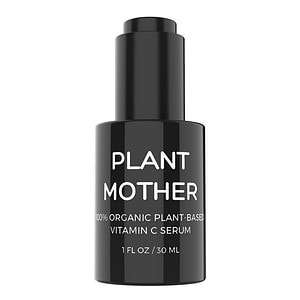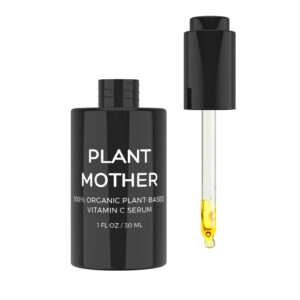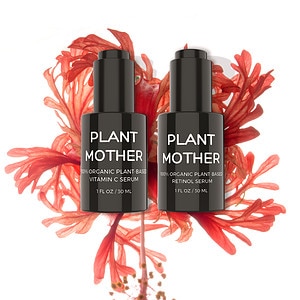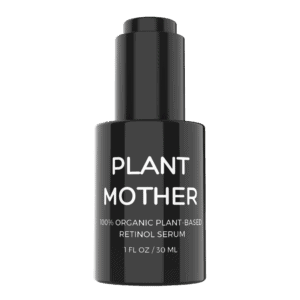Can You Use Vitamin C Serum While Breastfeeding?

Many young moms and soon-to-be moms have reached out to us asking if it was safe to use Vitamin C serum while breastfeeding and during pregnancy. In this post, we’re going to shed some light on this popular topic. We’ll look into different types of Vitamin C and see how safe they are. Additionally, we’ll look into how you should use Vitamin C serum safely during pregnancy and breastfeeding. Finally, we’ll see how well Vitamin C combines with other ingredients used in your daily skincare routine.
TABLE OF CONTENTS
- Vitamin C Serum While Breastfeeding: Are All Vitamin C Products Same?
- Is Vitamin C Serum Safe During Pregnancy and Breastfeeding?
- Which Vitamin C Serum Is Best?
- Can You Use Vitamin C With Retinol During Pregnancy and Nursing?
- Should You Use Hyaluronic Acid with Vitamin C?
- What About Glycolic Acid and Vitamin C While Breastfeeding and Pregnant?
- Peptides and Vitamin C For New Moms
- Azelaic Acid and Vitamin C While Pregnant and Nursing
- BHA and Vitamin C serum For New Moms
- AHA and Vitamin C – ok to use together?
- Vitamin C Serum While Breastfeeding – Key Takeaways
Are All Vitamin C Products Same?
No, not all Vitamin C products are same. There is synthetic and plant-based Vitamin C. Most Vitamin C serums in the market are synthetic and made with chemical ingredients. This is not bad in itself, but this form of Vitamin C is very hard to preserve and keep stable. It is mainly water-based. Therefore, most Vitamin C products have water as their main ingredient. In order to create a stable Vitamin C within a water-based formula, companies add heavy doses of preservatives. Then they add synthetic fragrance to mask the smell (or lack of it) of synthetic chemicals.
So, do you want to put chemicals on your skin during pregnancy and nursing? The answer is of course no. Vitamin C serum or cream while breastfeeding and pregnancy is not a bad product to use at all, it’s the type of Vitamin C you choose that plays an important role.
Unlike synthetic Vitamin C, there’s a botanical alternative to this lab-produced ingredient. That’s plant-based Vitamin C. Plant Mother has created a 100% plant-based Vitamin C. It’s clean, safe, non-toxic, and is oil-based instead of water based. This serum is rich in natural, botanical antioxidants, multi-vitamins, and over 200 vital nutrients your skin needs. Instead of Vitamin C mixed with water and heavy chemicals, you get clean, plant-based Vitamin C, full of healthy nutrients and vitamins that your skin craves especially during pregnancy and nursing.

Is Vitamin C Serum Safe During Pregnancy and Breastfeeding?
Depends on the Vitamin C serum formula you choose to use. Many vitamin C face products are fine to use while pregnant and breastfeeding. But to be 100% safe and ensure you know exactly what is in your products, we recommend to look for a 100% clean, organic, plant-based vitamin C serum. This Vitamin C serum during breastfeeding and pregnancy is perfectly fine.
Of course, even with natural Vitamin C serums, always check the label first. There are companies who promote their products as natural and vegan, but they mix natural ingredients with synthetic ones. So, make sure you look at labels. They should be transparent and have all the ingredients listed. There should be no guessing games involved. You know everything that you are putting on your skin is safe, plant-derived, and most importantly still works. Look for 100% natural, healthy, plant-based ingredients. These act like natural health boosters and act like skin food.
Which Vitamin C Serum Is Best?
Luckily, there are great plant-based options that provide the same skin-loving benefits as the synthetic Vitamin C serums. But without the harsh, unsafe chemicals.
Plant Mother’s Vitamin C Serum is a clean nutritious antioxidant serum with over 20 nourishing botanicals. It is 100% organic and plant-based, with zero synthetic chemicals or fragrances. The serum contains Kakadu Plum which is considered to have the highest concentration of natural Vitamin C, 55 times more than in oranges. This vegan serum combines natural Vitamin C from Kakadu Plum, Cloudberries, and Goji Berries with pure Vitamin E and niacin from Maracuja oil. These hero ingredients work together to tackle signs of aging, improve sun damage, and stimulate collagen production. Plant Mother’s Vitamin C Serum while breastfeeding and pregnancy is perfectly safe to use. However, always consult your doctor before starting to use a new product.
Additionally, Plant Mother is committed to producing the cleanest, healthiest products that are good not only for your health, but also for the planet, and animals. The company uses sustainable practices, recycled packaging, and zero-waste/no plastic policy. For that reason, many young moms use Plant Mother’s serums.

Can You Use Vitamin C With Retinol During Pregnancy and Nursing?
Not all Vitamin C and Retinol Serums can be used during pregnancy. Actually, most Retinols are considered unsafe for pregnant and nursing women. There is one caveat though. You need to use the right Vitamin C and Retinol products and you need to know how to use them correctly and safely. Therefore, be careful which Retinol and Vitamin C serums you choose.
First and foremost, you need to use clean, organic, plant-based Vitamin C and Retinol Serum. Everything we said about the best vitamin C while breastfeeding and pregnancy applies here.
When it comes to Retinol, Plant Mother has the cleanest, organically grown Retinol Serum. It boosts your skin as much as your overall health. 100% organic, safe, nutritious and healthy; a true skin food packed with precious ingredients. That’s why it’s perfect for young nursing moms. The brand’s Retinol and Vitamin C serums are beyond clean and beyond green – they’re free of chemicals, packed with pure botanical nutrients, antioxidants, and multivitamins.
Retinol and Vitamin C work well together to provide the skin with necessary nutrients and anti-aging actives. Vitamin C serum should be used during the day because it helps protect your skin from free radicals and environmental damage. On the other hand, it’s best if you use Retinol at night.
Can You Use Hyaluronic Acid with Vitamin C During Pregnancy and Nursing?
Yes! Hyaluronic Acid can be used with Vitamin C serum. Hyaluronic acid is produced naturally in the body, but when applied topically it has amazing moisturizing benefits for your skin. It binds water to skin cells, ultimately creating a moisture barrier and decreasing fine lines and wrinkles.
Most acids are considered unsafe during pregnancy and nursing, with the exception of azelaic acid, glycolic acid, and hyaluronic acid. Most can be used with Vitamin C, by layering them together or using them separately (one in the morning the other one during the night).
While pregnant and breastfeeding, hyaluronic acid can be used alongside Vitamin C serum to keep you looking young, fresh, and moisturized. You can mix them together or apply hyaluronic acid as a second layer after the Vitamin c serum.
Glycolic Acid and Vitamin C While Breastfeeding and Pregnancy?
Glycolic Acid can be used during pregnancy. Make sure it’s in a modest, low dosage though. When paired with vitamin C serum, they both can help brighten, soften, and even out your skin tone. If using both ingredients during pregnancy and nursing, they should be staggered in their application; it is best to apply Vitamin C face cream or serum in the morning, and glycolic acid at night.
Glycolic acid is an alpha-hydroxy acid (AHA) that comes from sugar cane. This Glycolic AHA is an exfoliant. It helps get rid of the top layer of dead skin cells. Then it uncovers the new layers of fresh, bright cells, leaving you with glowing soft skin. Additionally, glycolic acid is a simple structured molecule with minimal weight, making it easy to penetrate deep beneath the skin. This helps with collagen production, ultimately firming the skin and reducing the look of wrinkles and fine lines.
So, Vitamin C during pregnancy and breastfeeding is safe to use with glycolic acid, but it’s best to use products with a low percentage of glycolic acid, below 7%.

Peptides and Vitamin C For new Moms
They can be used with Vitamin C serum during pregnancy and nursing. Both peptides and vitamin C have incredible benefits for the skin, and they can be used together to create the perfect combination. Peptides are amino acids that can help the skin produce collagen to keep your skin firm and wrinkle-free. They penetrate deep into the skin to reduce inflammation, clear breakouts, and increase elasticity.
When layering, it is best to start with the thinnest serum and then apply the thicker serum, so depending on what peptide and vitamin C formula you are using, apply accordingly!
Azelaic Acid and Vitamin C While Pregnant and Nursing
You can use both Azelaic Acid and Vitamin C serum in your daily skin routine. When it comes to acids, most of AHAs and BHAs are considered unsafe in pregnancy. However, there are exceptions such as azelaic acid, glycolic acid, and hyaluronic acid. Azelaic acid is neither a BHA or AHA. It can be found naturally in the body and has numerous benefits when applied topically. Azelaic acid is known for reducing breakouts by gently exfoliating the skin to clear clogged pores while generating new skin cells. Additionally, it can reduce uneven skin tones and heal hyperpigmentation.
So Vitamin C serum while breastfeeding and in pregnancy is safe to use with azelaic acid. When used together, it is once again best to stagger them. For best results, use Vitamin C in the morning and Azelaic acid before bedtime.
BHA and Vitamin C serum While Breastfeeding
It is recommended that you do not use BHAs – salicylic acid in pregnancy. BHA is a beta-hydroxy acid used to unclog pores and boost collogen production, which can help with acne, fine lines, and hyperpigmentation. It can cause dryness and irritation if not used as directed.
AHA and Vitamin C During Pregnancy and Breastfeeding
As we said earlier, most AHAs are considered unsafe during pregnancy and breastfeeding and you should avoid them. AHA is an alpha-hydroxy acid and is an exfoliant used to smooth fine lines and wrinkles, improve skin texture, and unclog pores. These acids can be very strong and cause dryness or irritation if not used properly.
Vitamin C Serum While Breastfeeding - Key Takeaways
- Vitamin C should be included in everyone’s skincare routine, regardless of their age or skin condition. This popular vitamin is well-known for its brightening and anti-aging properties, and dermatologists consider it to be one of the most powerful antioxidants available.
- If you’re pregnant or a nursing mom you don’t want to risk your health and the health of your baby for beauty. And rightfully so. This is the time in your life when you need to clean your lifestyle, your diet, and your beauty routine. Therefore, only choose healthy products without any chemicals and potential endocrine disruptors.
- Vitamin C serum while breastfeeding is safe – especially if it’s 100% clean, organic, vegan formula. Don’t risk using synthetic Vitamin C because it’s often mixed with harsh chemicals in order to achieve optimal stability. You should also get informed on the use of retinol while breastfeeding.
- Not all Vitamin C serums are same. Look for a 100% clean, organic, plant-based vitamin C serum. Make sure you read labels and learn how to use it properly. Always check out Vitamin C serum before and after results.
- Avoid products containing parabens, phthalates, “fragrance”, and harsh chemicals – during pregnancy and any other time in your life.
- Most AHAs AND BHAs are considered unsafe during pregnancy and breastfeeding and you should avoid them.
- Exceptions are glycolic acid, azelaic acid, and hyaluronic acid. Make sure you know what dosages to use and what products to mix them with.
MEDICAL DISCLAIMER
This content is for informational and educational purposes only. It is not intended to provide medical advice or to take the place of such advice or treatment from a personal physician. All readers of this content are advised to consult their doctors or qualified health professionals regarding specific health questions. The publisher of this content does not take responsibility for possible health consequences of any person or persons reading or following the information in this educational content. All viewers of this content, especially those taking prescription or over-the-counter medications, should consult their physicians before beginning any nutrition, supplement, skincare product, or lifestyle program.
REFERENCES:
- https://www.babylist.com/hello-baby/pregnancy-safe-skin-care
- https://theplantmother.com/product/organic-plant-based-vitamin-c/
- https://theplantmother.com/product/organic-plant-based-retinol-serum/
- https://theplantmother.com/natural-fertility-boosters/
- https://theplantmother.com/vegan-retinol/
- https://theplantmother.com/fertility-crystals/
- https://theplantmother.com/dry-skin-during-pregnancy/
- https://theplantmother.com/how-to-balance-hormones/
- https://theplantmother.com/cerave-vitamin-c-serum/
- https://theplantmother.com/covid-vaccine-and-fertility/



